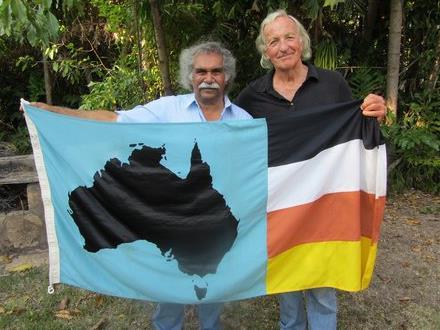Diversity is championed in the annual commemoration of the arrival of the First Fleet on the Australian continent and in the celebration of a nation settled by migrants. Of course, the irony of a holiday predicated upon the act of appropriating land and status from the country’s original inhabitants – all the while claiming to celebrate Australia in all its forms – is forever evident. This dichotomy plagues the nation not only on one day, but on every day throughout its history. The chasm between the more privileged lives of the white populace and the diminishing Indigenous community have only increased in the country’s 226 years of settlement.
A news bulletin opens John Pilger and Alan Lowery’s (The War You Don’t See) documentary Utopia. It shows mining magnate, Lang Hancock, espousing his thoughts on the first Australians and methods for dealing with race relations. Sadly, the content that follows is scarcely less infuriating. Returning to the subject that informed Pilger’s earlier books: The Secret Country – The First Australians Fight Back (1985), A Secret Country (1989) and Welcome to Australia (1999), the journalist and filmmaker tours the nation to once again reveal the reality faced by Indigenous Australians. Despite claims of reconciliation and recognition monopolising media attention – abuse, inequality and denigration continue with institutionalised discrimination maintaining the status quo.
Taken from the Australian Bureau of Statistics, haunting facts provide damning evidence of the rates of mortality and imprisonment in the Indigenous population and punctuate the film’s chapters with the documentarian cycling through the history and politics of the topic. Each segment endeavours to incite further dismay, starting broadly by reviewing living conditions comparable to those of nineteenth-century Dickensian England, the ongoing prevalence of preventable diseases, and the institutionalised persecution and prejudice. As the face and voice of the feature, Pilger sifts through each topic, comparing the truth against the rhetoric that swells around such mistreatment.
Specific circumstances only deepen the dismay, as Utopia flits between instances of pronounced atrocity. The masking of the origins of Rottnest Island – now packaged as the site of a day spa – proves among the calmer segments, thereby speaking volumes about other examples that fill the feature. The plight of Arthur Murray in campaigning against unfair working conditions, as well as the blight of deaths in custody, both moves and educates. Revisiting the Lateline controversy of sensationalist reporting of unfounded sex slavery and petrol kingpins in Mutitjulu shows government intervention at its worst. Acts of eugenics and genocide committed under the auspices of the White Australia policy defy belief as much as decency. The list of such situations goes on.
Crowning the meticulously researched and extensively contextualised assemblage of information, Pilger’s outraged viewpoint is apparent from the outset. His language as damning as it is determined; however his palpable passion doesn’t dampen the message. The writer, director and producer’s efforts are heavy-handed and repetitive, but his subject demands it. The film is at its most potent in illuminating and sometimes heated interviews – with those at the centre of his exposé, with academics and politicians, and in garnering the opinions of ordinary Australians – and the filmmaker’s ceaseless appetite enhances the immediacy and urgency.
Utopia’s title comes from the region of the Northern Territory that forms much of the film’s setting – the most disadvantaged and poorest place in Australia. Again the paradox is unmistakable. The absurd naming of a location beset by unthinkable horrors with a term synonymous with perfection is emblematic of Pilger’s position. Vox-pop chats with merry-makers in Sydney on Australia Day in 2013 also underscore the contrast between reality and representation, where the participants are chilling with their opinions on the country’s first inhabitants. That’s the crux of the purposefully punishing, suitably sprawling Utopia. For all the conversation that intimates otherwise, the film successfully argues that the divide and the discrimination only continues.
Rating: 3 ½ stars out of 5Utopia
Director: John Pilger
UK, 2013, 110 mins
Release date: January 30
Distributor: Antidote
Rated: M
Actors:
Director:
Format:
Country:
Release:





